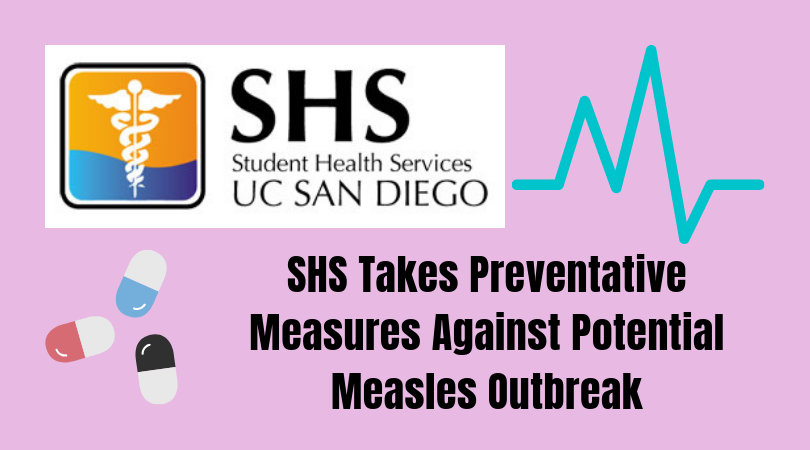UC San Diego Student Health Services, an on-campus healthcare resource and primary care provider for many students, is taking preventative measures against the possible spread of measles. The Center for Disease Control confirmed over 700 individual cases of measles this past year across 23 states, making this the greatest number reported in the United States since 1994 and since measles was declared eliminated in 2000.
According to the CDC, measles is a contagious airborne viral disease. The symptoms of the disease include fever, coughing, a runny nose and a rash of tiny red spots.
UCSD’s Office of Student Health and Well-Being sent out an all-campus email on April 26 to alert students about a measles outbreak in Los Angeles. More than 1000 students and faculty at UCLA and California State University, Los Angeles were quarantined or sent home earlier that same day.
The email included guidance from the CDC and the California Department of Public Health encouraging vaccination, supporting early identification, and providing information about the measles virus and its symptoms. It also urged students to review documentation of their measles vaccination and immunity status and to contact SHS if they suspect that they’ve been exposed to measles.
As of the time of this article’s publication, 44 confirmed measles cases have been reported in California this year. San Diego County has not had a reported case of the measles since 2017.
The LA Times reported that past measles outbreaks in California are the result of a fall of vaccination rates due to unfounded fears that vaccines cause autism and other chronic diseases. As of 2017, the state-wide vaccination rate is 96.9 percent, above the nationwide rate of 91.1 percent.
In an email to the UCSD Guardian, the SHS Director of Medical Services Dr. Stacie San Miguel said that they are taking action to identify students who do not have documented immunity to measles.
“We are currently working to identify those students who are not immune to measles,” Dr. San Miguel said. “If there was an exposure, these students would be quarantined until their immunity status was determined. They could be quarantined for up to 8 days if exposed.”
Dr. San Miguel also said that SHS will hand over authority to San Diego County in the event of a measles outbreak at UCSD. No adjustments to these contingency plans have been made in the face of the recent reported measles cases.
“If there is an outbreak of measles at UCSD, we would first contact the San Diego County Public Health Department, UC San Diego Health and various campus departments,” San Miguel said. “Our main priority is to get students who have incomplete documentation of measles vaccination up to date on their vaccines now, so that if there is a case of measles at UCSD, the students will already have immunity.”
Starting in Fall of 2016, a UC system-wide requirement mandates that all students provide documentation of up to 6 vaccine preventable diseases, which includes measles. A person is considered immune to measles if they received 2 doses of the MMR vaccine or if they have tested positive for immunity by proof of blood test.
When asked what role students can play in aiding UCSD’s preventative measures, San Miguel encouraged students to visit SHS for either testing or vaccination in the event that they do not have documentation of their immunity to measles. The measles vaccine is fully covered for students with the UC Student Health Insurance Plan. Students with Reduced Access Fee for Tritons or their own private insurance will have to pay $78 for the vaccine.
San Miguel also stressed that students need to practice good hygiene techniques to prevent the spread of infection like “[covering] their coughs, not [sharing] utensils or drinks, and [washing] their hands frequently.”
Associated Students’ AVP of Health and Wellness Revati Rashingkar told the Guardian that the Office of Health and Wellness is hoping to partner with SHS in creating a vaccine clinic to aid preventative measures.
“The Office of Health and Wellness and SHS have begun a discussion about the possibility of having a vaccine clinic for measles, but nothing has been decided yet due to the measles vaccine having temperature regulation needs that the clinic structure may interfere with and other [logistical] concerns,” Rashingkar said. “I have also offered my support however needed to [Dr. San Miguel] in [SHS’s efforts] to prevent a measles outbreak.”
Rashingkar noted that she was unaware of what UCSD administration has done so far to reach out to faculty and staff regarding immunization. She expressed her hopes that university officials have taken action to guarantee that “[something has been done] to ensure that the members of our campus who are not students also get fully immunized if possible, since SHS is exclusively for students and their efforts won’t reach every person on campus that could contribute to an outbreak.”
Earl Warren College freshman Genesis Campbell expressed disbelief that students have to worry about a measles outbreak even with the availability of vaccination.
“I think more than anything, I’m shocked that [the measles virus] is threatening the wellbeing of students,” Campbell said. “We shouldn’t be dealing with this when there’s a perfectly-tested vaccine that is 100 percent effective.”
As of the writing of this article, no measles outbreaks have been reported on campus. Students showing symptoms of the disease are encouraged to call SHS at 858-534-3300 for further instructions. They should not visit SHS in person or any health care facility until they have spoken to a healthcare provider.
Graphic courtesy of Jacob Sutherland.














